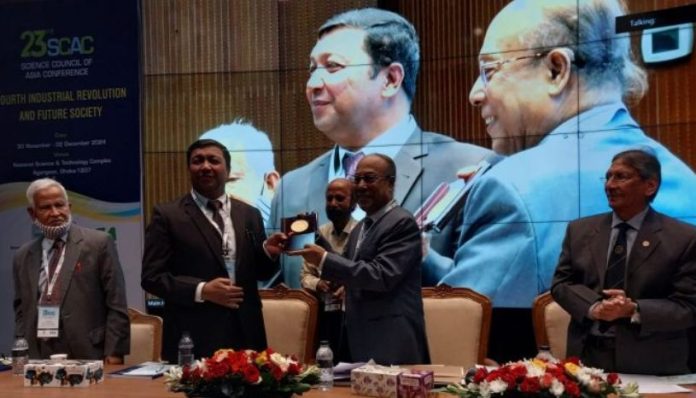Faisal Sheikh
ISLAMABAD, DEC 1: The 23rd Science Council of Asia Conference (23rd SCAC) held in Dhaka, Bangladesh from November 30 to 3 December, was organized by the Bangladesh Academy of Sciences and the Science Council of Asia, with support from the Ministry of Science & Technology, Bangladesh.
The theme of the conference, “Fourth Industrial Revolution and Future Society,” resonated deeply with the challenges and opportunities facing societies in this era of rapid technological advancement.
Coordinator General COMSTECH Prof. Dr M. Iqbal Choudhary emphasized knowledge-driven socioeconomic development at the Conference 2024 in Bangladesh
Addressing the 23rd Science Council of Asia Conference 2024, CG COMSTECH and Vice President of the World Academy of Sciences (South and Central Asia), emphasized that in today’s world, socioeconomic development is no longer reliant on natural resources but rather on knowledge and its applications.
During his speech, referencing a 2019 report by the McKinsey Global Institute, Prof. Choudhary noted that 12 disruptive technologies are expected to generate over $33 trillion in wealth by 2025.
These include advancements in mobile internet, artificial intelligence, IoT, advanced robotics, genomics, nanotechnology, and regenerative medicine. However, he pointed out that much of this progress is concentrated in the Global North, while many developing nations continue to grapple with superstition and ignorance.
He quoted Klaus Schwab, founder of the World Economic Forum, who stated, “We stand on the brink of a technological revolution that will fundamentally alter the way we live, work, and relate to one another.”
Prof. Choudhary emphasized that the Fourth Industrial Revolution is evolving at an exponential pace, disrupting industries and transforming systems of production, management, and governance globally. The theme of the conference directly aligned with this rapidly changing landscape, where technological innovation is reshaping not just economies but entire societies.
During his visit to Dhaka, Prof. Choudhary also held productive meetings with senior officials from Bangladesh’s Ministry of Science & Technology and other key stakeholders. These discussions reaffirmed Bangladesh’s keen interest in fostering collaboration with COMSTECH and Pakistani institutions. Both sides expressed a shared commitment to working together for the advancement of science, technology, and innovation, aiming to bring tangible benefits to the people of both brotherly nations.
To ensure that developing nations can benefit from these technological advancements, Prof. Choudhary called for bipartisan political support for education, science, and technology.
He stressed the need for increased investment in education, research, and development, as well as greater female participation in science. He also highlighted the importance of protecting intellectual property rights and fostering global collaboration in science and technology to address global challenges.
As Coordinator General of the OIC Standing Committee on Scientific and Technological Cooperation, Prof. Choudhary underscored the importance of nurturing the youthful population in the OIC region, with 50% under the age of 25.
He highlighted COMSTECH’s initiatives to promote science, technology, and innovation (STI) within its member states, including scholarships, research grants, and training programs.
He expressed COMSTECH’s readiness to collaborate with the Asian Science Council to launch joint programs that will empower young scholars and foster sustainable development.

















